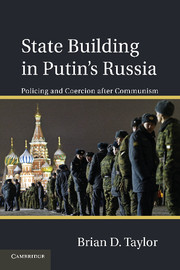Crossref Citations
This Book has been
cited by the following publications. This list is generated based on data provided by Crossref.
Kalinin, Kirill
and
Mebane, Walter R.
2011.
Understanding Electoral Frauds Through Evolution of Russian Federalism: From ‘Bargaining Loyalty’ to ‘Signaling Loyalty’.
SSRN Electronic Journal,
Dawisha, Karen
2011.
Is Russia's Foreign Policy That of a Corporatist-Kleptocratic Regime?.
Post-Soviet Affairs,
Vol. 27,
Issue. 4,
p.
331.
Koesel, Karrie J.
and
Bunce, Valerie J.
2012.
Putin, Popular Protests, and Political Trajectories in Russia: A Comparative Perspective.
Post-Soviet Affairs,
Vol. 28,
Issue. 4,
p.
403.
Hensell, Stephan
2012.
The Patrimonial Logic of the Police in Eastern Europe.
Europe-Asia Studies,
Vol. 64,
Issue. 5,
p.
811.
Horne, Cale
2012.
The Consistency of Policy with Opinion in the Russian Federation, 1992–2006.
Journal of Elections, Public Opinion & Parties,
Vol. 22,
Issue. 3,
p.
215.
Thornhill, Chris
2012.
National Sovereignty and the Constitution of Transnational Law: A Sociological Approach to a Classical Antinomy.
Transnational Legal Theory,
Vol. 3,
Issue. 4,
p.
394.
Siroky, David S.
and
Dzutsev, Valeriy
2012.
Rational or reckless? Georgia's zugzwang in the Caucasus.
Nationalities Papers,
Vol. 40,
Issue. 3,
p.
303.
Robinson, Neil
2013.
Economic and Political Hybridity: Patrimonial Capitalism in the Post-Soviet Sphere.
Journal of Eurasian Studies,
Vol. 4,
Issue. 2,
p.
136.
Toal (Gearóid Ó Tuathail), Gerard
and
O'Loughlin, John
2013.
Inside South Ossetia: a survey of attitudes in ade factostate.
Post-Soviet Affairs,
Vol. 29,
Issue. 2,
p.
136.
Campana, Aurélie
2013.
Beyond norms: the incomplete de-securitisation of the Russian counterterrorism frame.
Critical Studies on Terrorism,
Vol. 6,
Issue. 3,
p.
457.
O’Loughlin, John
Toal (Gearóid Ó Tuathail), Gerard
and
Chamberlain-Creangă, Rebecca
2013.
Divided space, divided attitudes? Comparing the Republics of Moldova and Pridnestrovie (Transnistria) using simultaneous surveys.
Eurasian Geography and Economics,
Vol. 54,
Issue. 2,
p.
227.
Marten, Kimberly
2013.
The Transnational Governance of Violence and Crime.
p.
23.
Robertson, Graeme
2013.
Protesting Putinism.
Problems of Post-Communism,
Vol. 60,
Issue. 2,
p.
11.
Light, Matthew
and
Kovalev, Nikolai
2013.
Russia, the death penalty, and Europe: the ambiguities of influence.
Post-Soviet Affairs,
Vol. 29,
Issue. 6,
p.
528.
2014.
Patronal Politics.
p.
95.
Light, Matthew
2014.
Police reforms in the Republic of Georgia: the convergence of domestic and foreign policy in an anti-corruption drive.
Policing and Society,
Vol. 24,
Issue. 3,
p.
318.
Kalinin, Kirill
2014.
Is There Anything Wrong with Putin's Electoral Ratings? A Study of 2012 Russian Presidential Elections.
SSRN Electronic Journal ,
Rochlitz, Michael
Kulpina, Vera P.
Remington, Thomas F.
and
Yakovlev, Andrei A.
2014.
Performance Incentives and Economic Growth: Regional Officials in Russia and China.
SSRN Electronic Journal,
Rivera, David W.
and
Rivera, Sharon Werning
2014.
Is Russia a militocracy? Conceptual issues and extant findings regarding elite militarization.
Post-Soviet Affairs,
Vol. 30,
Issue. 1,
p.
27.
Semukhina, Olga
and
Reynolds, K. Michael
2014.
Russian citizens' perceptions of corruption and trust of the police.
Policing and Society,
Vol. 24,
Issue. 2,
p.
158.





